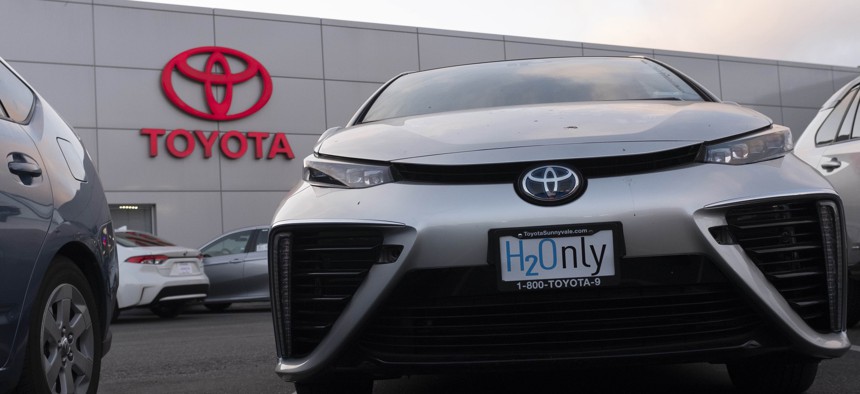States Partner With Hopes of Becoming Hubs for Hydrogen Fuel

A Toyota Mirai hydrogen fuel cell car. is seen at a car dealership in San Jose, California in 2019. Yichuan Cao/NurPhoto via Getty Images
Hydrogen could serve as an alternative way to power vehicles and there’s money in the infrastructure law to give it a boost.
Seven Midwestern states promised Monday to work together to make the Great Lakes region a hub of research and production of hydrogen fuel, a move that they said would help boost their economies and speed the adoption of the potential alternative to gas and diesel.
“We don’t have to choose between clean energy and clean air and creating good-paying jobs and a strong economy—we can do both,” said Wisconsin Gov. Tony Evers, a Democrat, in a statement. “I’m proud to join this coalition.”
Other states with governors who signed onto the agreement included Illinois, Indiana, Kentucky, Michigan, Minnesota and Ohio.
The memorandum of understanding between the states calls on them to work with private companies, universities and nonprofit organizations to create a regional market for “clean hydrogen” and associated products.
Governors in other regions have also been collaborating on developing hydrogen technologies and markets.
The agreement among the Midwestern governors could lead to greater collaboration in the future. It says the participating states could collaborate on developing regional clean hydrogen hubs, which the federal government is supporting with money from the Infrastructure Investment and Jobs Act.
Under the 2021 infrastructure law, there’s $8 billion from the U.S. Department of Energy available for those hubs, which would be designed to link clean hydrogen producers, potential consumers and providers of infrastructure that could connect them in the same region.
Kentucky Gov. Andy Beshear, also a Democrat, said his state was in a good position to promote the use of hydrogen in the future. A Toyota factory in Kentucky is scheduled to begin producing dual fuel cell modules that can be used in heavy-duty commercial trucks. The state also has a large network of pipelines that could transport hydrogen, and three of its interstates were designated as federal hydrogen transportation corridors, Beshear noted.
“Kentucky’s robust infrastructure, strong chemical and manufacturing base, along with our leadership in the automotive and logistics sectors position us as a natural location for economic development in hydrogen,” he said in a statement.
While hydrogen fuel cells only release water as a byproduct, the process of extracting the hydrogen used in the cells from other compounds can produce greenhouse gases. The vast majority of hydrogen produced in the United States uses natural gas to unlock the fuel. Even though the process releases carbon dioxide, it still produces less greenhouse gases than using gasoline-burning vehicles.
But the Midwestern governors, like many of their counterparts across the country, hope their states can develop even cleaner ways of producing hydrogen for vehicle use.
“Investing in clean hydrogen is a key component of decarbonizing the transportation, manufacturing and agriculture industries,” the office of Illinois Gov. JB Pritzker wrote in a statement. “By jumpstarting the hydrogen market in the Midwest, the state of Illinois will add to its robust number of clean energy jobs and bring down the cost of clean energy alternatives for those who reside here.”
In the Northeast, six states have joined a similar effort to become a clean hydrogen hub. That push, led by New York Gov. Kathy Hochul, now includes Connecticut, Maine, Massachusetts, New Jersey and Rhode Island. They are working with 60 outside partners, including utilities, universities, equipment manufacturers and nonprofits.
Daniel C. Vock is a senior reporter for Route Fifty based in Washington, D.C.
NEXT STORY: How State Laws Pose a Roadblock for One of Biden’s Infrastructure Goals






